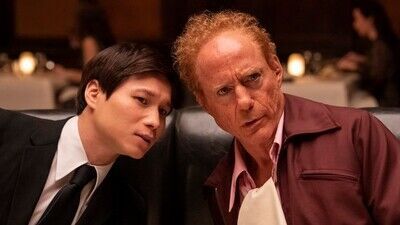The narrator is in a Vietnamese communist reeducation camp when the audience first meets him. His sole task is to prepare an account of his efforts to aid the revolution. Sweat pours off his neck, off his eyelids, staining his uniform, as he sits in a wooden solitary holding cell, writing about his work as a communist embedded inside the Vietnamese Secret Police, passing on valuable information about espionage to his comrades in the Viet Cong. The narrator’s perpetually preoccupied, tinpot dictator of a boss, known only as the General (Toan Le, born for the part), does not suspect a thing, nor does Claude (Robert Downey Jr., unrecognizable in a curly ginger wig, complete with eyebrows, and wide blue-black contact lenses), the narrator’s CIA handler and recruiter.
The narrator has two best friends, with whom he forged a long-lasting bond at the age of 14: Bon (Fred Nguyen Khan) is an anti-communist army paratrooper, counting the days till he, his wife, and newborn child will be able to flee Vietnam for America. The other, Man (a stellar Duy Nguyen), is a dentist and the narrator’s VC handler. In addition to the bombs raining down around them, Man and the narrator are weighed down by the secret they conceal from their dearest friend. The VC are due in Saigon any day now, as thunderclaps of artillery remind the residents of the city. While Claude does manage to help the narrator, the General, and many of their colleagues escape, their departure from Saigon is marred by bombs falling from the sky and unimaginable heartbreak. Once in LA, the sympathizer is still required to report on the General’s activities back to the VC, which sets off a cycle of death, destruction, and lies, equally calamitous as the war they left behind.
Park Chan-wook’s direction of the first three episodes is among his finest work. It isn’t just that his fluid direction makes the episodes feel like one long, gliding film rather than episodic television. It’s that he forges an extraordinary relationship with the material that creates a luminous visual texture; the viewer can practically feel the sweat of Saigon emanating from the screen, the viscosity of rich red blood blasting out of a skull, the lissome slipperiness of pho noodles slurping into happy mouths. As in “Oldboy” and “Decision to Leave,” Park expands shots using wide angles, displaying the effect of one character on others in the background, causing the stakes to change without everyone in the frame even realizing it. His camera glides with wit and insouciance, reflecting changes in fortune and mood. Speaking of which, entire dissertations could be penned on his predilection for reflective surfaces (like Wes Anderson, perhaps his closest stylistic contemporary, Park enjoys finding new ways to use the same bag of tricks): mirrors, glass coffee tables, double-sided glass in interrogation rooms. By finding multiple ways to convey the bounty of themes at work, Park creates a kinetic storytelling energy that is rarely found in American TV. Credit also belongs to his editors Vikash Patel (“Ozark”) and Jin Lee (“Ma”), who use dissolves and match cuts in ways that are both humorous and meditative. Their collaboration with Park is poetry in motion, each cut, each move of the camera adding greater dimension and speed to the story.

